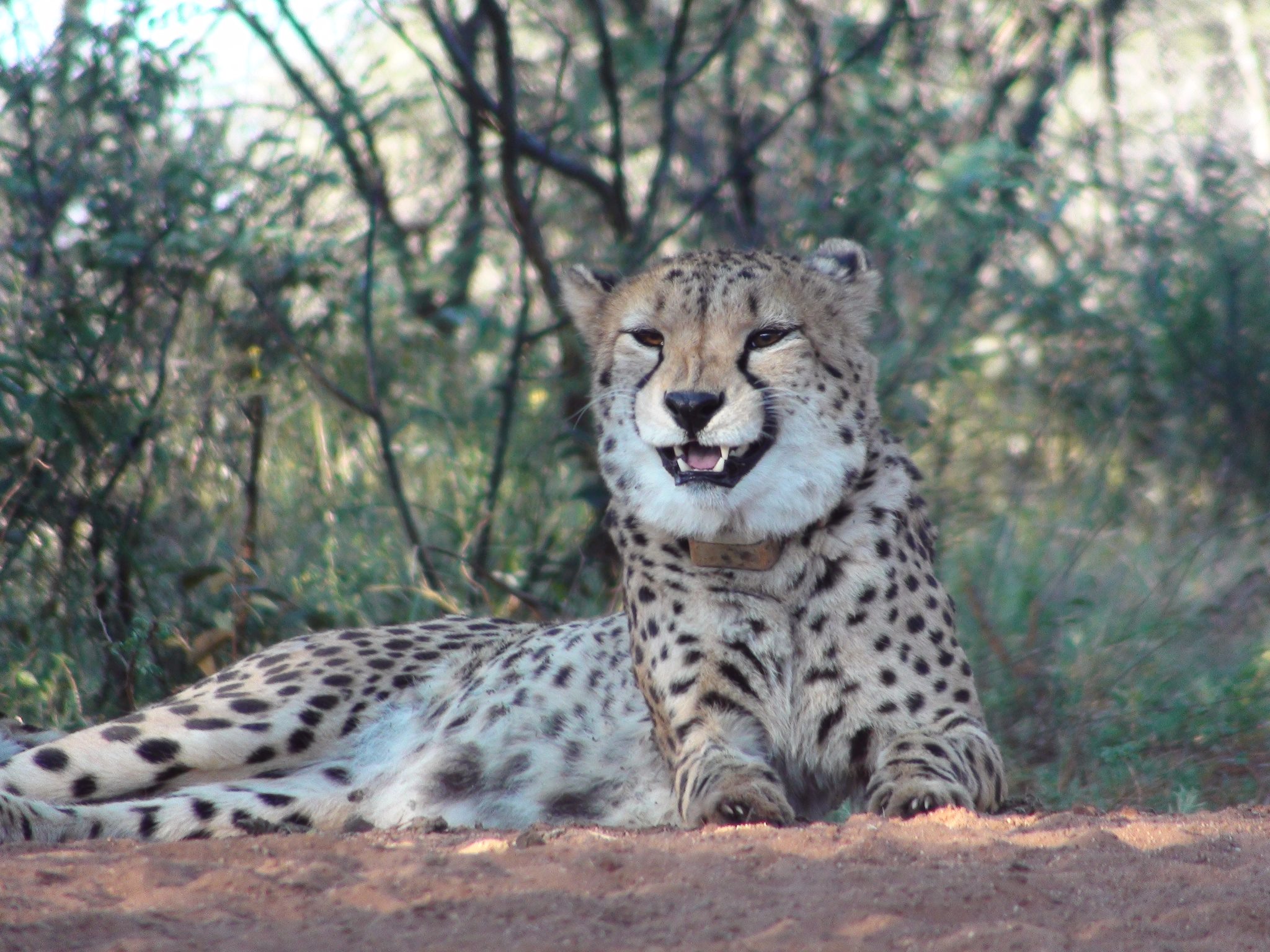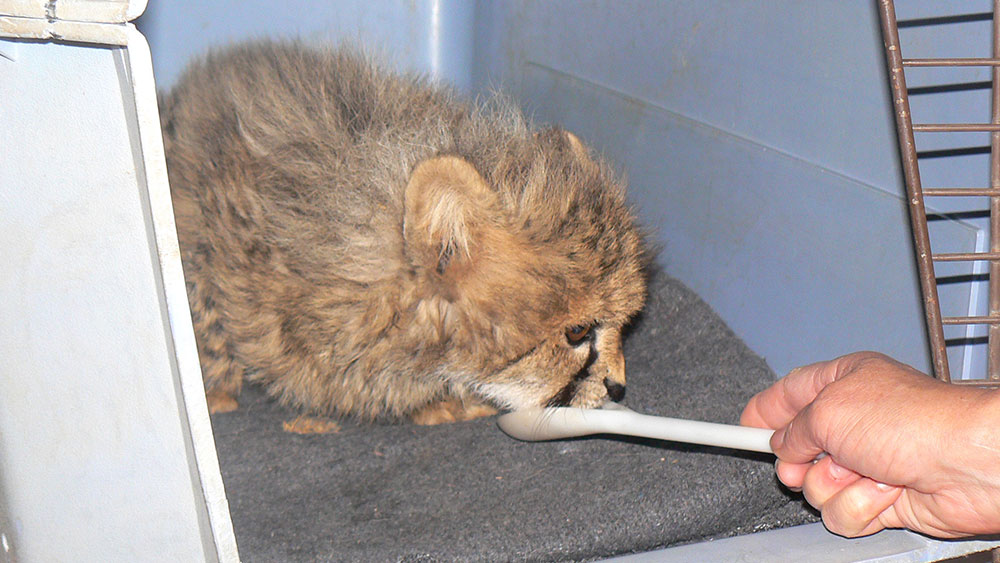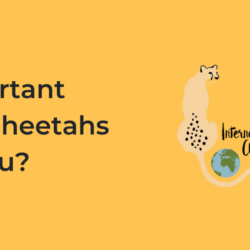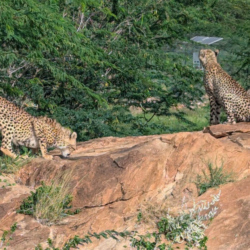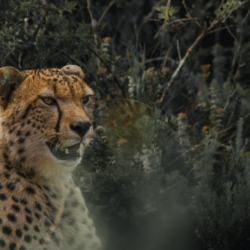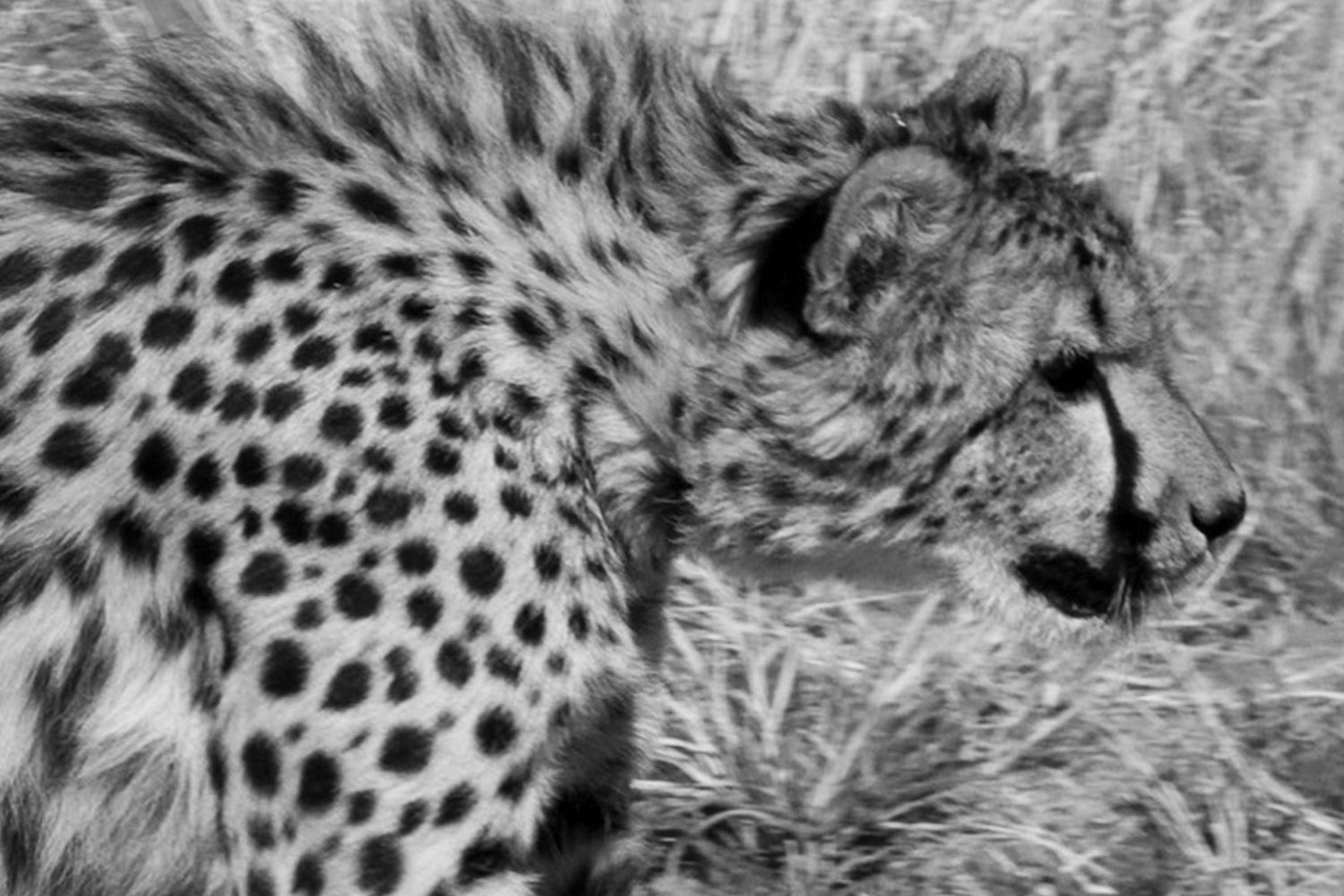Eulogies: Darwin and Little C
-

- by 19 October 2021

Darwin
Darwin came to the Cheetah Conservation Fund along with seven other cheetahs in March 2007, after being trapped as a cub for hunting blesbok and springbok. They were kept in a garage with no daylight and a poor diet for about six months, which caused calcium deficiencies that stunted their growth. Under the expert care of Dr. Laurie Marker and the CCF staff, they were given a correct diet and exercise once they arrived, but unfortunately the damage to their joints was permanent, and they stayed small and short in stature for the rest of their lives.
Darwin lived most of his life in a male group which we fondly called “The Scientists”. It consisted of Darwin (named after Charles Darwin), Livingstone (David Livingstone), Fossey (Dian Fossey) and Mendel (Gregor Mendel). The four of them were a strong, very closely bonded group, and always let the other cheetahs in the area know that they were in charge. Darwin and his brother Livingstone were the calmest out of the four, typically following Mendel or Fossey’s lead. With his unique white tip on the end of his tail, and his big inquisitive eyes, Darwin was always a favourite of guests and volunteers, and one of our most photogenic cheetahs. He was also very vocal and would let you know exactly how hungry he was by vocalizing the loudest chirps and meows he could until he was fed. Cheetahs are cats, and can be extremely stubborn at times, following their own schedule rather than that of their keepers. But luckily Darwin was extremely food motivated and was always one of the first cats up to the feeding camps in the mornings. He loved running after our feeding truck. While he wasn’t the fastest runner because of his shorter legs, he always gave 100% effort, and always made it to the end of the runway, even if it took him a couple of extra seconds to get there. As he got older and his mobility decreased, occasionally we would have to drive into the enclosure and find him, but he always made it easy for us, sitting in the exact same spot every day, waiting patiently for us to deliver his food.
After losing his coalition mates Mendel, Fossey and most recently Livingstone, the decision was made to move Darwin to a slightly smaller enclosure – a retirement home of sorts – where he could receive extra care and attention in his older age. He moved in with his sister Kayla next door, and while the two of them were brother and sister, the mostly just avoided each other and respected their individual spaces. Being 15 years old, Darwin did suffer from medical issues caused by old age. His teeth were quite worn, and he had begun to lose his vision in the last year. With the assistance of the veterinary team, Darwin received medical treatment included joint supplements and daily subcutaneous fluids to make sure he stayed hydrated. The cheetah team minced up meat for him twice a day so that it was nice and easy for him to eat and digest. Even with all the care and medical treatment, Darwin’s body could not fight against age. While it was a sudden loss for the team, Darwin knew it was his time, and passed away peacefully in his sleep laying in his favourite haybed under a tree.
Darwin was an amazing cheetah to work with, and a great ambassador for his species. He will be greatly missed by his keepers, CCF staff and everyone whose lives he touched in his time here.
Little C
Little C when he was brought to CCF Namibia as a cub in 2007
Little Chewbaka, or Little C as he was affectionately known by his keepers, arrived at the Cheetah Conservation Fund in 2007 when he was approximately a month old. After being found without a mother on a farm, a kind little boy picked him up, and hid him in his bedroom, sharing his food with him. Unfortunately, cheetah cubs grow fast, and it quickly became apparent that food rations were going missing. Luckily the family made a good decision, and rather than keeping Little C as a pet in their home, they called CCF to come and pick him up. But without the help of that brave little boy, Little C probably wouldn’t have survived.
When he first arrived at CCF, having lost his mum, and being in a strange new place, Little C was very nervous and scared, as would be expected. He spent the first couple of nights in a small nursery room to settle in with Dr. Bruce Brewer sleeping in a bed next to him. Little wasn’t quite sure what to make of this new environment and home, and especially the strange creature sleeping next to him. But after some gentle coaxing, he grew brave enough to jump up onto the bed one night and found that Dr. Bruce was not a bad substitute for mum, even if he looked a little bit different. Even after meeting other keepers and other cheetahs, Dr. Bruce was always Little C’s “mum” and would always greet him at the fence with purrs, even while ignoring the rest of us.
Little C was named after Chewbaka, one of the first orphaned cubs that lived at CCF. Typically, male cheetahs will live together in coalitions with their brothers when they get older, and normally do not like other males. Chewbaka was 12 years older than Little C which is a big age difference, but Little C had his heart set on being best friends. Their enclosures were next to each other, and Little C could often be found playing or lounging next to Chewbaka. With his age and wisdom, Chewbaka allowed Little C to settle into life at CCF, which in turn Little C would later pass on to two younger cubs – N’Dunge and Shunga. Together with another male named Ron, Little C, N’Dunge and Shunga formed a strong coalition, and lived together their entire life.
Because we called him Little C, he had to prove us all wrong by growing into one of the largest cheetahs that we had a CCF. Weighing nearly 50kg, and with his dark, fluffy coat, Little was a beautiful cheetah. Guests would marvel at his size and his speed during our cheetah runs, where the cheetahs chase a mechanical lure. Little would walk out into the run pen and had a ritual where he would hide behind a tiny rock, watching and waiting for the rag to go past him. The rock was about a quarter of his size, and while all of us could clearly see him, he thought he was the most sneaky, stealthy cheetah in the whole world hunting his rag. We never told him otherwise. Whoever was running the lure when he ran needed to have good reflexes, as he would suddenly dart from behind his hiding spot, and nearly outpace our motor running about 60km an hour. Showing off beautifully what cheetahs are meant to do, not just running but flying, ears pinned, tail streaming behind him. He knew he ran well and would always look for his keepers to give him extra treats after he caught the rag, not wanting to let go of his prize until we gave in and gave him more.
While the cheetahs in our care are considered captive animals, we are lucky to be able to provide them large, quite natural enclosures. CCF is situated on a wildlife reserve, and so we are constantly surrounded by wildlife, including wild cheetahs. We do regular enclosure maintenance and check our fences on a daily basis to make sure no animals are getting in or out. However, it can still happen. In the early hours of the morning, two wild male cheetahs broke through the fence into Little C and Ron’s enclosure. There was a fight, and Little sustained fatal injuries. The veterinary team tried everything that they could, but it was decided that the best decision for Little C was that he was euthanized, with no more pain or suffering. It was a devastating, sudden loss to our team, and especially to Dr. Laurie Marker, and Dr. Bruce Brewer who had looked after Little C for his entire 14 years at CCF. He touched many lives in his time here, and while we wish that he could have spent a few more years with us, we know saying goodbye was the best thing to do. He will be greatly missed, but we will continue to carry out his legacy, saving cheetahs and changing the world in his honour.
If you would like to read about our other resident cheetahs or sponsor them to help us care for them, please visit our sponsorship page.
Related Reading
-
30 October 2024
Meet the Bandit Group: a crew of cheetahs aged 9 to 11 months
